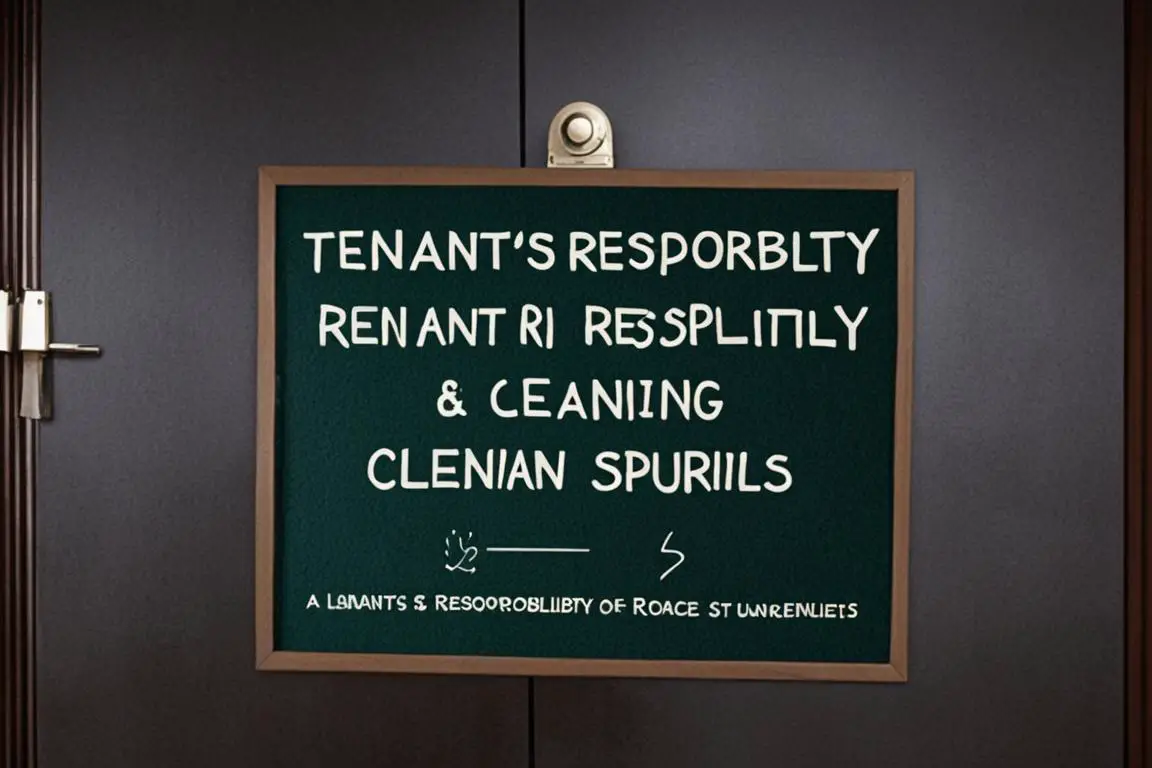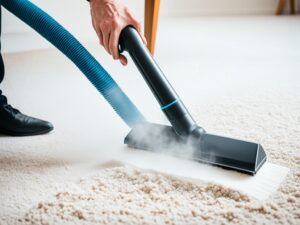The responsibility for carpet cleaning in rental properties can often be a source of confusion for both tenants and landlords. Understanding who is responsible for this task is essential for maintaining a clean and well-maintained rental space. While there may not be a definitive answer, certain guidelines can help shed light on this issue.
In general, the law does not allow landlords to charge tenants for carpet cleaning. However, there are situations where a landlord can deduct carpet cleaning costs from a tenant’s security deposit. Factors such as the condition of the carpet at move-in and whether any damage is due to normal wear-and-tear or tenant negligence are taken into consideration.
Key Takeaways:
- Landlords are typically responsible for carpet cleaning in rental properties.
- Tenants may be responsible for cleaning costs in cases of excessive dirtiness or damage caused by their negligence.
- State laws play a crucial role in defining these responsibilities.
- Landlords cannot withhold security deposits for normal wear and tear.
- Tenants have recourse if landlords unlawfully withhold security deposits.
The Landlord’s Responsibility for Carpet Cleaning
In most cases, it is the landlord’s responsibility to clean the carpets in a rental property. Carpet cleaning is considered a cost incurred by the landlord for renting out the apartment. However, the carpets must be returned to the same condition they were in at the time of move-in, except for normal wear-and-tear. If the damage is beyond normal wear-and-tear and is the result of the tenant’s negligence, the tenant may be responsible for the cost of cleaning the carpet.
In order to maintain a clean and inviting living environment for tenants, landlords should prioritize regular and thorough carpet cleaning. Not only does this enhance the overall appearance of the property, but it also prolongs the lifespan of the carpets and improves indoor air quality.
“Clean carpets not only create a positive first impression, but they are also essential for maintaining a healthy living space for tenants.”
To ensure the carpets are properly maintained, landlords should establish a regular carpet cleaning schedule. This can involve hiring professional carpet cleaning services or providing tenants with guidelines for self-cleaning using approved methods and products.
The Benefits of Regular Carpet Cleaning
Regular carpet cleaning has numerous benefits for both landlords and tenants. Some of these include:
- Improved air quality: Carpets can trap allergens, dust, and bacteria, which can affect indoor air quality. Regular cleaning eliminates these pollutants, creating a healthier environment for tenants.
- Prolonged carpet lifespan: Regular cleaning removes dirt and debris that can cause carpets to deteriorate over time. This helps extend the lifespan of the carpets, reducing the need for frequent replacements.
- Enhanced appearance: Clean, fresh-smelling carpets contribute to a more visually appealing living space. This can attract and retain quality tenants, leading to higher tenant satisfaction and reduced turnover.
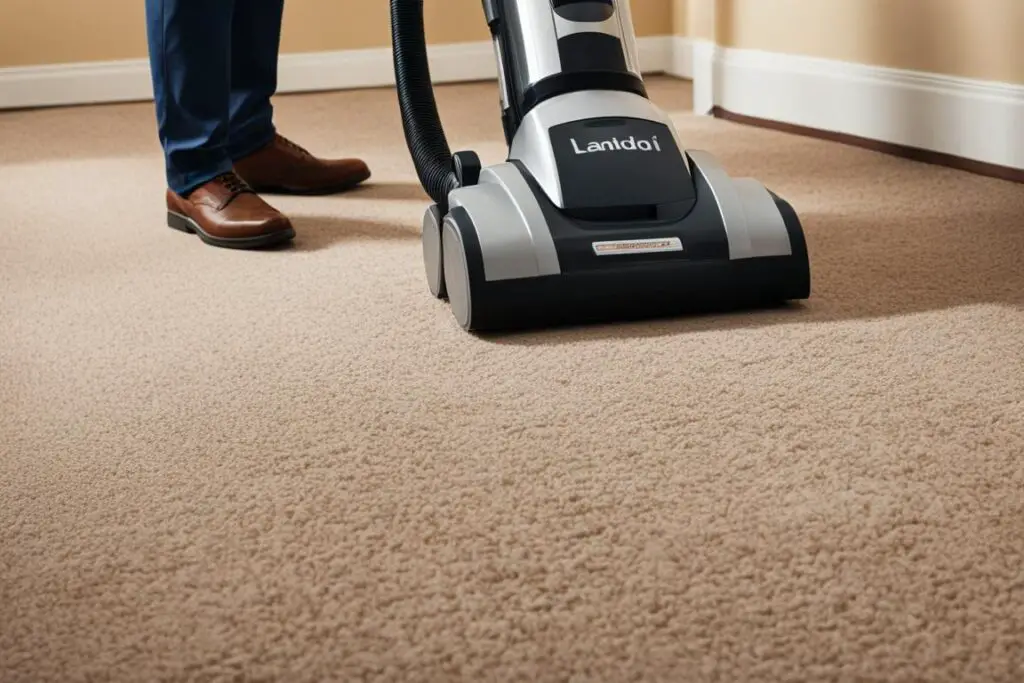
| Landlord Responsibilities | Tenant Responsibilities |
|---|---|
| Regular carpet cleaning based on established schedule | Reporting any damages or spills that require professional cleaning |
| Ensuring carpets are in good condition at move-in | Cleaning carpets as per lease agreement terms |
| Addressing any carpet maintenance or repair needs promptly | Returning carpets in the same condition at move-out, except for normal wear-and-tear |
When Can Landlords Charge Tenants for Carpet Cleaning?
Landlords have the right to charge tenants for carpet cleaning under specific circumstances. If the carpet in a rental property is excessively dirty or damaged, such as major stains, oil spillage, or paint or animal urine on the carpet, the landlord can require the tenant to pay for cleaning. It is essential to note that the determination of what constitutes excessive dirtiness is often based on the cost of professional cleaning exceeding standard rates.
Additionally, if a tenant fails to adequately clean the carpet at move-out, the landlord may deduct the cost of carpet cleaning from the security deposit. This deduction serves to cover the expenses incurred by the landlord for restoring the carpet to its original condition. To ensure clarity and transparency, lease agreements may also include provisions that explicitly state the tenant’s responsibility to cover the costs of professional carpet cleaning.
Important Note: The landlord’s right to charge tenants for carpet cleaning must be exercised in compliance with applicable laws and regulations. It is crucial for both landlords and tenants to familiarize themselves with the specific legal requirements in their jurisdiction to avoid any misunderstandings or disputes.
Instances Where Tenants May Be Charged for Carpet Cleaning:
- If the carpet is excessively dirty or damaged, resulting in additional cleaning costs beyond normal wear and tear.
- If the tenant fails to adequately clean the carpet at move-out, leaving it in a condition that requires professional cleaning.
- If the lease agreement includes provisions explicitly stating the tenant’s responsibility to cover the costs of professional carpet cleaning.
It’s important for tenants to understand their obligations regarding carpet cleaning and to take appropriate measures to maintain the carpet’s cleanliness throughout the tenancy. Doing so can ensure a smooth transition at move-out and help tenants avoid any unexpected deductions from their security deposit.
Next, we will explore the legal restrictions that landlords must consider when charging tenants for carpet cleaning in rental properties.
Legal Restrictions on Landlords Charging for Carpet Cleaning
While landlords have the right to charge tenants for carpet cleaning in certain circumstances, it is important to be aware of the legal restrictions surrounding this practice. In some states, landlords are prohibited from demanding that tenants pay for professional carpet cleaning before moving out. This means that landlords cannot force tenants to cover the costs of carpet cleaning as a mandatory expense.
If a lease agreement includes a clause requiring the tenant to pay for carpet cleaning, it may still be enforceable. However, tenants cannot be held responsible for normal wear and tear or damages that are not caused by their negligence. It is essential for landlords to understand the difference between excessive dirtiness and regular wear and tear to determine whether they can charge tenants for carpet cleaning expenses.
“Landlords cannot withhold security deposits for normal wear and tear or damages for which the tenant cannot be held responsible.”
If a tenant fails to comply with a carpet cleaning clause in the lease agreement, the landlord may deduct the cost of professional cleaning from the tenant’s security deposit. However, this deduction can only be made for damages beyond normal wear and tear that are attributable to the tenant’s actions. Landlords must be cautious and ensure that they are not unlawfully withholding security deposits.
Note: Insert image here:
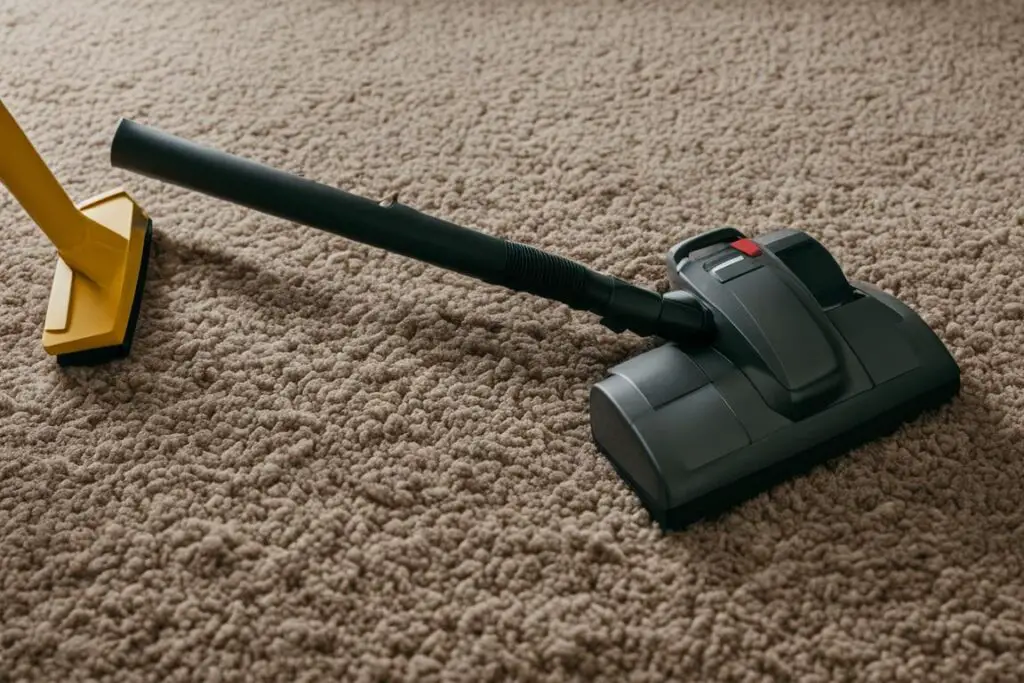
Understanding State Laws on Carpet Cleaning Responsibility
When it comes to determining responsibility for carpet cleaning in rental properties, state laws play a crucial role. While there are common guidelines, it’s important to consult the specific laws of the state in question to ensure compliance. Understanding these laws is essential for both landlords and tenants to avoid disputes and legal issues.
Lease agreements should align with state laws regarding carpet cleaning in rental properties. It’s important for landlords to be aware that deducting carpet cleaning costs from security deposits may not be allowed unless permitted by law. By adhering to state regulations, landlords can maintain transparency and fairness in their rental agreements.
Tenants, on the other hand, have rights and recourse if landlords violate these laws. If a landlord wrongfully withholds a security deposit for carpet cleaning expenses, tenants can file complaints with the relevant authorities or even pursue legal action. Familiarizing themselves with their rights can help tenants protect their interests and ensure fair treatment.
State laws on carpet cleaning responsibility can vary, so it’s crucial to seek legal advice or consult the appropriate resources to understand the specific regulations applicable to your location. By being knowledgeable about these laws, both landlords and tenants can uphold their rights and responsibilities and avoid unnecessary conflicts.
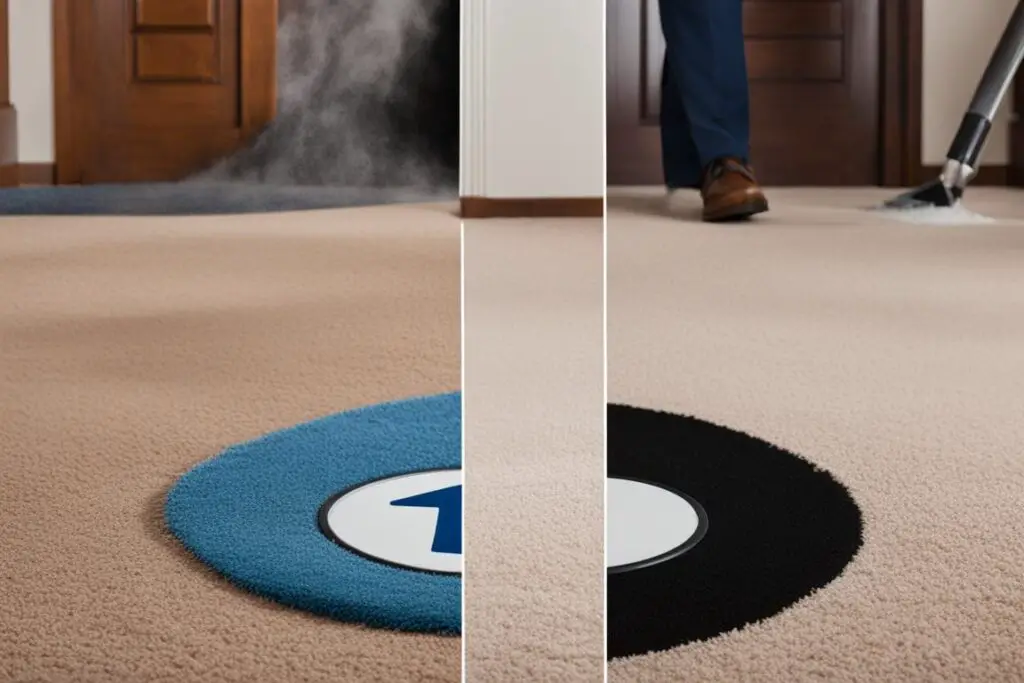
In summary, understanding state laws regarding carpet cleaning responsibility is essential for both landlords and tenants. By following these laws, landlords can ensure fair treatment of tenants and maintain compliance with legal obligations. Tenants, on the other hand, can protect themselves from any wrongful deduction of security deposits and seek appropriate recourse if necessary. Consult the specific laws of your state for comprehensive guidance on carpet cleaning responsibilities in rental properties.
Conclusion
Determining who pays for carpet cleaning in rental properties can vary depending on several factors, including the carpet’s condition at move-in and the presence of damages beyond normal wear and tear. As a general rule, it is the landlord’s responsibility to clean the carpets in a rental property. However, tenants may be held accountable for the cleaning costs in cases of excessive dirtiness or damage caused by their negligence.
State laws play a vital role in defining the responsibilities of both landlords and tenants when it comes to carpet maintenance in rental properties. It is crucial for both parties to familiarize themselves with the relevant laws and understand their rights and obligations. By adhering to the law, both landlords and tenants can ensure a fair and equitable resolution regarding carpet cleaning and maintenance expenses.
Clear communication and documentation between the landlord and tenant, such as a thorough move-in inspection report and a well-drafted lease agreement, can help prevent disputes over carpet cleaning costs. It is advisable for tenants to maintain the cleanliness of the carpets throughout their tenancy to avoid unnecessary charges and maintain a positive rental experience.
Ultimately, understanding the specific laws of the state and establishing a fair and transparent agreement between landlords and tenants is key to ensuring a smooth process for carpet maintenance in rental properties.
FAQ
Who is responsible for carpet cleaning in rental properties?
In most cases, it is the landlord’s responsibility to clean the carpets in a rental property.
Can landlords charge tenants for carpet cleaning?
Landlords can charge tenants for carpet cleaning under certain circumstances, such as excessive dirtiness or damage caused by the tenant’s negligence.
Are there any legal restrictions on landlords charging for carpet cleaning?
Yes, some states prohibit landlords from demanding that tenants pay for professional carpet cleaning before moving out. Landlords can only deduct the cost of carpet cleaning from the security deposit if permitted by law.
What happens if a landlord unlawfully withholds a security deposit?
Tenants may file complaints or claims to recover the wrongfully withheld amount.
Do state laws vary regarding carpet cleaning responsibility?
Yes, state laws can differ, so it is important to consult the specific laws of the state in question.
